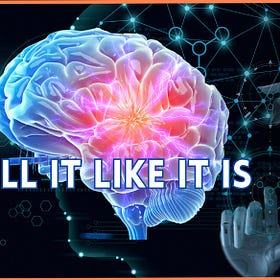OBLIVIATE: From Supercomputer to Filing Cabinets 2
TBI's annoying habit of vaporizing random memories.
How do I help you understand
what it feels like?
If you don’t KNOW…
you can’t know.
But I can take you other places.
Show you other things.
All aboard!
Imagine this: You once had a supercomputer inside your skull. It got smashed on the freeway by a drunk driver. Now you operate out of a nasty, creepy basement, storing all your memories in musty manilla folders inside row after row of filing cabinets. (That’s PART 1, if you missed it.)
Joyest of joys, all these cabinets are organized…
Drumroll, please…
🤘 ALPHABETICALLY. 🤘
Except when they’re not organized at all. Or when things get misplaced. Or mislabeled. Or when you open up a folder and everything inside it is just…
GONE.
THE GORILLA OF REVOKED MEMORY ACCESS
It’s not enough to merely store your memories. Where they really come in handy is your ability to access them, so down into the basement you go.
Once you have located a memory in your maze of filing cabinets, in order to access and use it, you now have to haul it back upstairs, which is a pain in the butt, because your tuchus has been tilted by scoliosis from being rammed into a construction median with a seatbelt on.
(I’m being literal and figurative here. Chronic bodily pain is as much a drain on the system as navigating all these mis-wired, mis-fired neurons.)1
There is also that towering, chuckling gorilla-of-a-door-guardian who takes immense pleasure in whimsically revoking your access card that would allow you to remove files from the basement and go through them where there’s…
Um…
Decent light by which to read? What a concept.
So as you stand on the stairs far above that one paltry swinging lightbulb, you stare with longing at the sliver of closed door you can spy over the gorilla’s shoulder. You’ve found the folders you need. They’re right there in your hot little hands. If you could just get them out there into full light, you’d be able to read them. So you beg. You plead. On a brave (foolish? impulsive? just plain dumb?) day you even threaten the gorilla.
He just guffaws because he knows you can’t do jack squat to him. You know, too. You’ve tried to manhandle that big brute, but if you push him too hard you’ll pay for it. All he has to do is poke you in the forehead with his gnarly middle finger to send you tumbling backward down the stairs where you will splat on the concrete, dizzy with a screaming skull and your papers scattered all around you.
You’ll have to clean up that mess and then take a nice, hard nap in order to do anything else for the rest of the day, so you don’t often try to launch an assault against the door gorilla. In fact, you’ve learned not to really even threaten him because he doesn’t have much patience for your rebellious, stubborn ass.
Work schedules? Pssssh. Responsibilities? Not his responsibilities. Your immediate need to operate a motor vehicle for that thing you have to get to? Not his problem. The health and enjoyment of your relationships? The gorilla doesn’t care.
His sole job is to determine when you are—and more importantly—when you are not allowed to access your memories. (You’ve been told that you don’t need to know the reasons for his rulings. Your job is to adhere to them, suffer his presence, and memorize your access codes through cognitive rehab. Fun.)
Thank goodness for the people who know your access codes—who know what it means when you’re stammering and stuttering and you have that certain look in your eyes. You know the one. The kind of desperation a drowning person has when they’re looking up at somebody standing next to the life buoy on the ship’s deck.
Sometimes this happens when you can see the word you want to speak—you’re holding the dang stickie note! You can even make it out in the dim light, but you can’t carry it past the freakin’ gorilla so you can get the freakin’ thing out your freakin’ mouth. Sometimes this happens with somebody’s name or how you know them. Sometimes it happens with an entire folder of memories.
Sometimes some nice person will punch in the access code from the other side of the door, so the gorilla will open it and step aside. You would swear he’s chortling as you stalk past him, a-glower and a-grumble with your folders or your hard-won word.
Upon slamming the door shut on his looming leer, you thank your friend for their assistance, because now y’all can finally go on with your conversation. Without that assistance, you’ll either have to say, “Fuck it!” and throw your folders up in exasperation so the gorilla will allow you back upstairs empty-handed, or you’ll be bogged down in Buffering Mode with the Hourglass of Doom spinning in your eyes until you remember what you were trying to say.
You revel in the times when the gorilla is out to lunch, or on a swanky date for the night, or off in the Caribbean on vacation. On those days, you get to access as many folders as you can carry upstairs, spreading them across the table in the library so you can try to make sense of what you’ve filed. All day long you dash from one table to another because you no longer have the supercomputer’s desktops to swipe through at Mach 10.
Sound exhausting?
It is. That’s the quintessence of the Spoon Theory, and that’s what you have a hard time getting anybody to understand if they haven’t experienced something like this themselves. Mostly they just call you “weak” and “a whiner.”2
You’ve inherited the gorilla’s guffaw about that one.
As it turns out, he really is chortling behind you today, because up there in the blessed light, you open up a folder—it truly is all in there, you swear!
Okay, fine.
It’s mostly in there.
OBLIVIATE.
Occasionally you open up a folder, only to discover that all of the memory contents that should be stuffing it are truly, randomly, and thoroughly…
GONE.
Like the name of that one song you danced to that one time. Actually, the entire existence of this song has been vaporized from your memory files, but how can that possibly be?
You obviously spent hour upon hour upon hour listening to it. This fact is irrefutable because you created, not only a full choreography to it, but also a super-complicated finger cymbal extravaganza on top of the moves.
(Another feat you had to re-learn after your first TBI. And again after the triple-whammy of Brain Traumas 2-4. This degree of multitasking and playing the darn metal clangers on the friggin’ beat at the same time as remembering and executing a choreography gives you no end of trouble. This really drives you bonkers because you still have an anal-retentive metronome inside your heart that used to run on the supercomputer. So you can hear that you’re behind the beat. You can feel it. You just can’t consistently make your body do what it’s supposed to anymore because you have damaged audio and motor cortices, and spine.)3
(The same thing happened really badly when you tried to sing just after your car wreck, except that staying on the beat wasn’t the only problem. Finding the correct notes felt like trying to aim at a dartboard by using a mirror over your shoulder. This was particularly infuriating because that had never happened to you before. Occasionally, it still does.)
Re-learning how to play zills, to sing, and to dance on the beat? MASSIVE cognitive retraining. Bonus: music & dance therapy can do a TBI goooood. Can confirm. 4
Anyway…
You know for a fact that you spent countless hours memorizing and rehearsing to this mystery dance song in order to pull off such complex zill-nanigans. This is undeniable history, because you’re watching yourself do it on a performance DVD you totally forgot you had. Since this disk was in a format that your DVD player couldn’t read back in 2004, you’re not even sure if you’ve ever seen this video footage before.
Either way, it sparks no memory of that dance. Hearing the song you danced to sparks zero remembrances of what comes next in the music or which moves come next in the choreography.
Why? Where did this memory go?
I dunno.
The super fascinating thing: to this day you can still pull off the accompanying zill-licious drum solo you did at that show with only a little bit of prompting, even though you haven’t done this dance in over a dozen years and you’ve had five other brain traumas in between.
🤷♀️
Brainzzzz…
Damaged ones.5
Your favorite thing ever is when people tell you, in an attempt to make you feel better, “Oh, pssssssh, that’s no big deal. I can nevvvver remember people’s names/song lyrics/choreographies/lines in a play/dates/historical facts/math formulas. I could nevvvvver clap on the beat/sing in tune/tell right from left. I alllllways forget my keys/where I put my stuff/the right word/what I had for lunch yesterday/etc/etc/etc/etc.... You worry too much.”
False.
Also unhelpful.
Potentially damaging.
It is a big deal, and I worry just the right amount, because these things didn’t used to be a problem for me. This is a sign of cognitive impairment, and my medical/support team needs to know such things.
I also need to know these things so I can:
map where my cognitive damage has occurred.
know what to retrain in cognitive therapy.
know what is healing and what is not, so I know what I have to jerry-rig, accept or protect.
stop feeling like I’m going insane because I’ve acquired the ability to accomplish Points 1-3.
and healthily engage in that little thing called GRIEVING.
(no. just because 2.5 months—or even 2.5 decades—have passed since the losses, this doesn’t mean I’m done grieving the literal death of myself or the things that were stolen from me by a drunk driver, a hacked-off, violent guy, and a dude not paying attention at a stop sign.)
(I might NEVER be done grieving the supercomputer. Don’t like it? There’s the door, and I assure you, the gorilla will hold it open for you. Wide open.)
(he might leer and breathe down your neck a little as you pass, but I won’t let him eat you. promise.)
(careful how you exit. don’t let the door hit you in the ass on the way out.)
(P.S. Fully and truly grieving is the opposite of “weak.”)
(Also. Expressing grief is not synonymous with “whining.”)
For anybody who genuinely wants to be supportive around these here parts, a more helpful way of phrasing an all-too-familiar commiseration is some rendition of, “Oh, that sucks. I totally know that pain, and it is not any fun. I’m so bummed you’re here in this club with us now. 💖 Go away. We don’t want you here. 💖 But since you’re here, I shall offer you the cookies we all eat in this clubhouse. Sorry for the nuts. Unless you like nuts.”
Sidenote: Some of those people who act like they’re trying to “make you feel better” are actually attempting to bypass your natural grieving process, and/or make you feel ashamed and/or guilty for speaking about your condition and the impact it’s had on your life. There are many reasons for this.
Again. There’s the door.6
We’ll address this entire subject more thoroughly later. Because it’s a big one. But I thought I should probably mention it a little here.
Where were we?
Oh, yeah. Sorry. We wander off on tangents a lot around here. Like…
A lot.
So, back to the black-holes in your memory.
THE PURGES
To this day, you still have super clear memories from the 70s, 80s, and 90s. Yet an entire swath of longterm memory data from one specific time period just after college is missing. These were obliterated from the supercomputer, in whole, across the board, just before everything was downgraded to analog. You've searched and searched, but you have to accept it. These, too, are simply…
GONE.
The discovery of this vanishing act only comes to light when you meet someone who says you know each other. As in, not merely were introduced once, but actually know each other. As in, they know the names of your cats and where you used to live.
Oh, really...?
Suspiciously, you have no file on them.
There’s not even a polaroid of them in that bulging album you made of Faces Without Names. If you're lucky, you recognize or even know the person, but when they speak of something you supposedly did together, you have zero documentation in storage.
Blink…blink…
“We were in a play together? I was in a play that year?”
*scratching head*
“Ummm…huh.”
For such data, you have inserted red construction paper into the filing cabinet where there should have been a folder. Hand-scrawled titles decorate the garish paper in your familiar all-caps:
THAT COMMUNITY PLAY I HEAR I WAS IN DURING MY JUNIOR YEAR OF COLLEGE:
REDACTED.
Now…why that particular memory chunk was chosen to receive Hermione Granger’s OBLIVIATE spell, we will never know.
It’s just what we do around here.
UP NEXT: PART 3 - How dangerous it can be when your past is riddled with black holes, and you don’t realize that Gremlins have been snatching your memories to hurl them into THE DUNGEON, night after night. At first it’s gonna suck when you read your journals to learn who you’ve been for the last three years.
And who other people have been with you.
But then it’s gonna be a fucking liberation.
© 2020 Hartebeast
RELATED POSTS:
Chronic pain impacts far more than your mood. It changes the structure of your brain and so much more.
Spoon Theory - another great metaphor for what it’s like living with a chronic health condition.
Feel the Beat: Music exploits our brain's ability to predict and the dopamine‐reward system to instill pleasure
How music shapes the brain’s structure and function: pitch, rhythm, tonality and more
MEMORY
How does the brain heal itself? Understanding neuroplasticity after TBI
You might not remember, but your body and your subconscious often do. One of the best books I have ever read in my life: The Body Keeps the Score: Brain, Mind & Body in the Healing of Trauma
Don't want to read the book? Here's the basic premise of what trauma does to the body and why talking about it, even in therapy, so often doesn't solve the problems: Short Version. Or Long Version by the author himself
THERE’S THE DOOR:
Emotional Invalidation - When Others Minimize or Ignore Our Feelings. Emotional validation is a learned art.
Don’t Let Anyone Tell You How To Grieve - or heal.
6 Sneaky Signs Someone Isn’t Supportive of Your Chronic Condition - And What To Do About It - misinformed “expert” opinions, unrealistic expectations, toxic positivity, ablism, dismissal, etc.
Medical Gaslighting - when the pooh-poohing and pshawing is done by your own medical team.









As I was reading this I was wondering if your entire memory was wiped like this or if it was worse around the time of the accident — and then you said you still have access to the 70s, 80s, and 90s and I was like ‘ohhh’.
It’s mind boggling (no pun intended) how our memory works with or without a TBI. And again you made me think something about your experience I never had before — losing access to parts of your memory, is, in some very real sense, like losing access to a part of yourself. Like what are we without the memories that ground us in reality. I can’t imagine how hard that would be. And I marvel at your resilience to not just push through but also find new ways to understand how your mind now works.